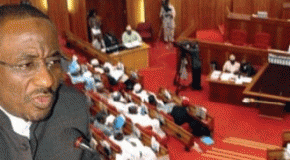Analysts, experts fault the move to strip CBN of its banking supervisory role
 Financial analysts, economic experts, and stakeholders have faulted the recent move by the House of Representatives to strip the Central Bank of Nigeria of its supervisory powers.
Financial analysts, economic experts, and stakeholders have faulted the recent move by the House of Representatives to strip the Central Bank of Nigeria of its supervisory powers.
Earlier, the Chairman, House of Representatives Committee on Banking and Currency, Mr. Jones Onyereri, said the house will focus on removing the CBN of playing the supervisory role this year.
Onyereri said the house will consider many alternatives, which he said might even be an independent body that will handle the job or even a new body.
In response, the experts said the move if completed may disfigure the system and work against the constitutional role for the creation of the Central Bank of Nigeria (CBN).
Counter reacting Onyereri said, the move will free CBN of the banking supervisory role and allow it to take care of monetary and currency issues.
Onyereri had said, “We are trying to take that banking supervisory function away from the CBN because if you look at it closely, especially in Nigeria, most of the problems we have in the industry has to do with supervision. For some reason, we believe that the hands of the central bank are full.
“Creating an independent body will enable the CBN to focus on its mandate of price stability and monetary policy.”
However, Managing Director/Chief Executive Officer, Financial Derivatives Company Limited, Mr. Bismarck Rewane he had suspected the move earlier, saying, “We cannot come out with a therapy without diagnosis.”
“The United Kingdom had done it and has gone full cycle. The European central bank is back to regulating the banks in Europe. However, in the United States, the office of the Controller of Currency is the one that regulates the banks. However, I am saying that today, in term of financial services regulation; I do not see that as a major problem. I think that we should focus more in making sure that monetary policy is aligned with the broad macroeconomic objectives of the country, rather than trying to cannibalise the powers of the CBN in any form,” Rewane said
In addition, a Senior Analyst at BGL Securities Limited, Mr. Femi Ademola, said the sector was responsible for the economy, therefore; it should not be handled recklessly just for the benefit of the economy, adding that any wrong move would cost the country a fortune.
He explained, “The experience of the Nigerian banking sector in recent years has not been very pleasing due to the avoidable disruptions that had been following the appointment of a new CBN Governor. The consolidation exercise of 2005 and the banking reform that started in 2009 created unnecessary disruptions in the economy, which perhaps led to the plans by lawmakers to take away the banking supervisory role from the CBN.
“By creating an independent body to oversee banking supervision, Nigeria would have decided to adopt the British system where banking supervision is being handled by the Financial Services Authority (FSA). However, due to the perceived failure of this model to prevent the banking crisis in the UK, the British government has decided to remove banking supervision from the FSA and added to the mandate of the Bank of England (BoE), the same model we currently operate in Nigeria, which also appear to be inadequate here.”
In the same direction, Ademola stated that “What this means is that even the proposed plans of by lawmakers may not work. However, we would not know until we have tried it. Different economies choose different models as appropriate.
“While I am not a fan of political inference in the financial system, in response to the global financial crisis, most countries are trying out alternative models to determine which is most appropriate. The lawmakers must carry the public along, be receptive to contrary views, and conduct adequate investigations before deciding on what model to adopt.”
In addition, the Managing Director of a leading investment banking firm who spoke in confidence said the move would at the end of the day lead to replication of responsibilities, “at a time when the federal government is talking about reduction in number of agencies.”









walerich
January 9, 2013 at 12:09 pm
I don’t think we need that for now until he economy is more stable